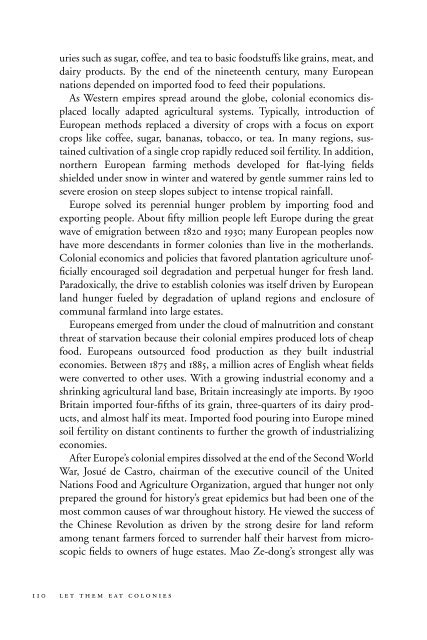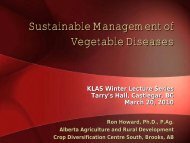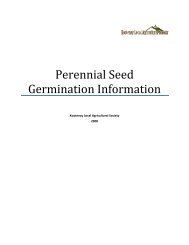Dirt: The Erosion of Civilizations - Kootenay Local Agricultural Society
Dirt: The Erosion of Civilizations - Kootenay Local Agricultural Society
Dirt: The Erosion of Civilizations - Kootenay Local Agricultural Society
Create successful ePaper yourself
Turn your PDF publications into a flip-book with our unique Google optimized e-Paper software.
110<br />
uries such as sugar, c<strong>of</strong>fee, and tea to basic foodstuffs like grains, meat, and<br />
dairy products. By the end <strong>of</strong> the nineteenth century, many European<br />
nations depended on imported food to feed their populations.<br />
As Western empires spread around the globe, colonial economics displaced<br />
locally adapted agricultural systems. Typically, introduction <strong>of</strong><br />
European methods replaced a diversity <strong>of</strong> crops with a focus on export<br />
crops like c<strong>of</strong>fee, sugar, bananas, tobacco, or tea. In many regions, sustained<br />
cultivation <strong>of</strong> a single crop rapidly reduced soil fertility. In addition,<br />
northern European farming methods developed for flat-lying fields<br />
shielded under snow in winter and watered by gentle summer rains led to<br />
severe erosion on steep slopes subject to intense tropical rainfall.<br />
Europe solved its perennial hunger problem by importing food and<br />
exporting people. About fifty million people left Europe during the great<br />
wave <strong>of</strong> emigration between 1820 and 1930; many European peoples now<br />
have more descendants in former colonies than live in the motherlands.<br />
Colonial economics and policies that favored plantation agriculture un<strong>of</strong>ficially<br />
encouraged soil degradation and perpetual hunger for fresh land.<br />
Paradoxically, the drive to establish colonies was itself driven by European<br />
land hunger fueled by degradation <strong>of</strong> upland regions and enclosure <strong>of</strong><br />
communal farmland into large estates.<br />
Europeans emerged from under the cloud <strong>of</strong> malnutrition and constant<br />
threat <strong>of</strong> starvation because their colonial empires produced lots <strong>of</strong> cheap<br />
food. Europeans outsourced food production as they built industrial<br />
economies. Between 1875 and 1885, a million acres <strong>of</strong> English wheat fields<br />
were converted to other uses. With a growing industrial economy and a<br />
shrinking agricultural land base, Britain increasingly ate imports. By 1900<br />
Britain imported four-fifths <strong>of</strong> its grain, three-quarters <strong>of</strong> its dairy products,<br />
and almost half its meat. Imported food pouring into Europe mined<br />
soil fertility on distant continents to further the growth <strong>of</strong> industrializing<br />
economies.<br />
After Europe’s colonial empires dissolved at the end <strong>of</strong> the Second World<br />
War, Josué de Castro, chairman <strong>of</strong> the executive council <strong>of</strong> the United<br />
Nations Food and Agriculture Organization, argued that hunger not only<br />
prepared the ground for history’s great epidemics but had been one <strong>of</strong> the<br />
most common causes <strong>of</strong> war throughout history. He viewed the success <strong>of</strong><br />
the Chinese Revolution as driven by the strong desire for land reform<br />
among tenant farmers forced to surrender half their harvest from microscopic<br />
fields to owners <strong>of</strong> huge estates. Mao Ze-dong’s strongest ally was<br />
let them eat colonies






